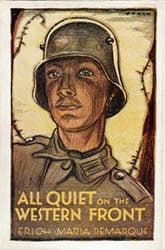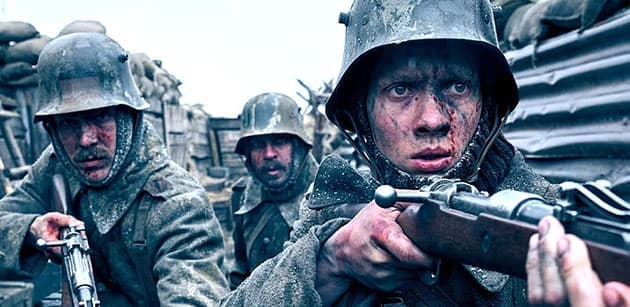All Quiet on the Western Front
Critique • Quotes • At the movies
 First American edition, 1929
First American edition, 1929First publication
1929
Literature form
Novel
Original title
Im Westen nichts Neues
Genre
Literary, war novel
Writing language
German
Author's country
Germany
Length
Approx. 67,000 words
Translations into English1929 by A. W. Wheen, 1993 by Brian Murdoch

Paul Bäumer (Felix Kammerer) learns the reality of war in 2022's All Quiet on the Western Front.
Of boys and dead men
All Quiet on the Western Front (2022): Film, 147 minutes; director Edward Berger; writers Ian Stokell, Lesley Paterson, Edward Berger; featuring Felix Kammerer, Albrecht Schuch, Daniel Brühl, Devid Striesow
You might wonder why we need another adaptation of All Quiet on the Western Front, given that the great war novel already has at least two treatments that could be considered classic. Is it possible to improve upon those previous efforts for a twenty-first-century audience?
Well, the producers of the 2022 movie would seem to think so. And, against all odds, they've largely succeed.
It's not that they've updated the film in any extensive way. The cinematography is more modern, the colour sharper and images more highly defined. But narratively the new All Quiet still follows the general outline of the novel and previous films: Paul Bäumer (Austrian actor Felix Kammerer) and his friends are young German men—boys really—who eagerly sign up to seek the glory of fighting for the Fatherland, but they find only misery, pain, savagery and death.
Their only uplifting experience is the growing bond among the soldiers, who form lasting friendships in the face of unremitting horror—lasting, that is, as long as they each live, which isn't long.
This screenplay, though, changes how each of the men dies—to great emotional impact, and with telling effect on Paul. We see him gradually hollowed out by the ongoing tragedies until he's completely dehumanized, a killing machine facing its own inevitable demise.
The last deaths actually take place after an armistice has been reached. The war is supposed to be over but an expedition by hungry soldiers to steal eggs from a farm leads to the death of Paul's last remaining comrade (German actor Albrecht Schuch).
Then a warmongering general sends soldiers, including Paul, into one more battle during the war's final minutes, allowing one last slaughter.
Teaser trailer for 2020's All Quiet on the Western Front on streaming television.
What's missing from this is the story in the book of Paul's return home during leave to face a non-understanding populace and say goodbye to a dying mother. To tell the truth though, this is not really missed. The drama is already so relentlessly dark and intense, the point is already made.
Traitors and peacemakers
In its place, the screenplay adds something not shown in any other version, nor in the book. Running parallel to the story of Paul and his mates is the attempt by Germany's new political leaders ("social democrats" apparently), appalled by the loss of life and impending social disaster, to win an armistice with France. The French, however, insist on complete surrender and the German leaders are forced to bend to the harsh demands, drawing the disdain of some of the military elite who consider them traitors.
We, of course, know this also provided ammunition for Hitler's later charges that Germany did not lose the war on the battlefield but was betrayed by socialists and Jews, which led to that even worse bloodbath known as the Second World War.
It's a bold idea to include this political maneuvering, and it could have gone horribly wrong. But it's handled well and ends up enriching the drama by showing what was going on behind the scenes while Paul and his comrades were dying.
— Eric

